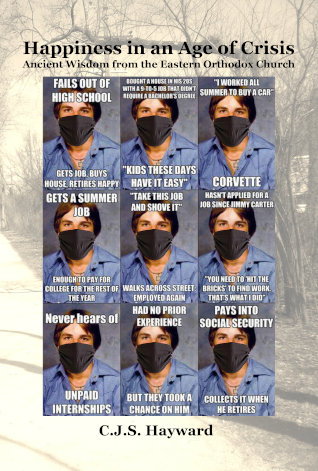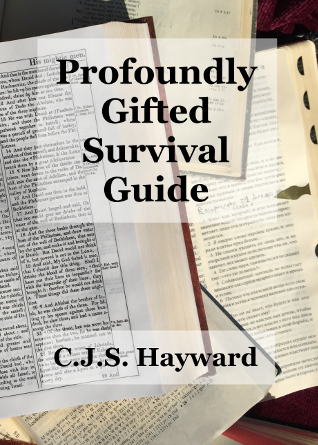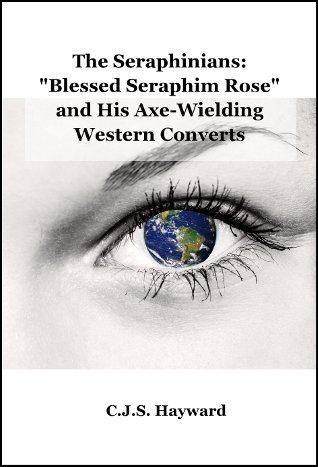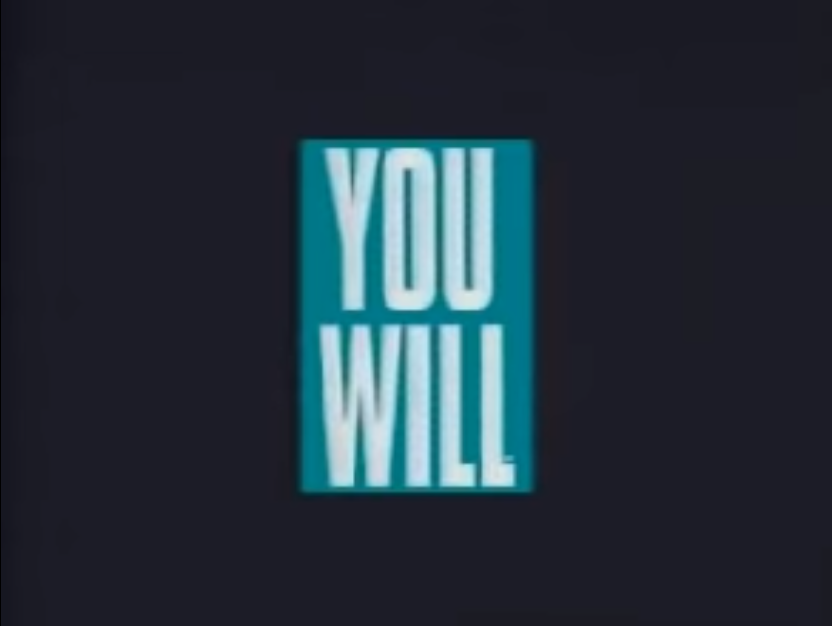No man can serve two masters: for either he will hate the one, and love the other; or else he will hold to the one, and despise the other. Ye cannot serve God and mammon. Therefore I say unto you, Do not worry for your life, what ye shall eat, or what ye shall drink; nor yet for your body, what ye shall put on. Is not the life more than meat, and the body than raiment? Behold the fowls of the air: for they sow not, neither do they reap, nor gather into barns; yet your heavenly Father feedeth them. Are ye not much better than they? Do you think you can add one single hour to your life by worrying? You might as well try to worry your way into being a foot taller!
And why take ye thought for raiment? Consider the lilies of the field, how they grow; they toil not, neither do they spin: And yet I say unto you, That even Solomon in all his glory was not arrayed like one of these. Wherefore, if God so clothe the grass of the field, which to day is, and to morrow is cast into the oven, shall he not much more clothe you, O ye of little faith? Therefore take no thought, saying, What shall we eat? or, What shall we drink? or, Wherewithal shall we be clothed? (For after all these things do the Gentiles seek:) for your heavenly Father knoweth that ye have need of all these things. But seek ye first the kingdom of God, and his righteousness; and all these things shall be added unto you. Take therefore no thought for the morrow: for the morrow shall take thought for the things of itself. Sufficient unto the day is the evil thereof.
The year was 2006 and I was studying at Fordham. A doctor made a mistake that let me be stressed to the point of uninterrupted waking nausea for weeks.
Part of my attendance at Cambridge, and then Fordham, was to get a PhD, the unofficial union card to teaching at university level, and the issue was not whether I would have the superhuman honorific of "Dr. Hayward." Or rather that was a secondary issue that did not help, but my fear was of something much worse: "Will there be a place for me?"
Before all of that, another physician had prescribed medications that made for a year of idleness, lying on my bed, staring at my light bulb, and thinking "This is worse than watching television." When the idleness ended, I found that my interests in the humanities came back quickly, computer work came back more slowly and perhaps not quite as well, but my discipline, mathematics, never came back. I had reconnected with math after four months away from math once before, and that was when I was significantly younger.
My study of academic theology was meant as retooling; since the door to mathematics was closed, information technology work had been a square peg in a round hole, and I looked for what next. I inquired about interdisciplinary PhD, and was told to pick a single academic discipline as his department had tremendous difficulties placing "American Studies" PhD's whose skills were divided between American history and literature: history departments wanted to hire a proper history PhD, and literature departments wanted to hire a proper literature PhD. And advised to pick one discipline, I picked the one that mattered to me most: theology.
And when things were turning ugly around Fordham, the question "Will there be a place for me?" was a question of what Providence I would be given. I've made a couple of forays at trying to teach theology without a PhD and without an Orthodox seminary degree, but no one has nibbled, and that may be just as well. But that left me with the square peg, round hole, and strong personalities who consider it disrespectful for a subordinate to be smarter than them. And I was going ahead, flailing.
Part of what I had worried before Fordham was how I would handle the daily grind, but for me a day's worth of daily grind is doable one day at a time. And after my parents explained that they were not going to keep the house indefinitely for me, I was able to retire on disability, and when Section 8 housing would have required injections I am not morally comfortable with, a door had been open and I have been a welcome guest at the little gem of St. Demetrios Skete.
There has always been a place for me. I don't know if I will die in a FEMA camp, but Paradise is wherever the saints are, and I am with (s)aints now. There has always been a place for me, and I believe God always will provide for me if I am faithful. I would recall the Akathist hymn "Glory to God for All Things:"
Glory to God for All Things
ODE 1
Everlasting King, Your will for our salvation is full of power. Your right arm controls the whole course of human life. We give You thanks for all Your mercies, seen and unseen: For eternal life, for the heavenly joys of the Kingdom which is to be. Grant mercy to us who sing Your praises, both now and in the time to come. Glory to You, O God, from age to age.
IKOS 1
I was born a weak, defenseless child, but Your angel spread his wings over my cradle to defend me. From birth until now, Your love has illumined my path, and has wondrously guided me towards the light of eternity. From birth until now the generous gifts of Your Providence have been marvelously showered upon me. I give You thanks, with all who have come to know You, who call upon Your Name:
Glory to You for calling me into being.
Glory to You, showing me the beauty of the universe.
Glory to You, spreading out before me heaven and earth, like the pages in a book of eternal wisdom.
Glory to You for Your eternity in this fleeting world.
Glory to You for Your mercies, seen and unseen.
Glory to You, through every sigh of my sorrow.
Glory to You for every step of my life’s journey,for every moment of glory.
Glory to You, O God, from age to age.ODE 2
O Lord, how lovely it is to be Your guest. Breeze full of scents — mountains reaching to the skies — waters like a boundless mirror, reflecting the sun’s golden rays and the scudding clouds. All nature murmurs mysteriously, breathing depths of Your tenderness. Birds and beasts of the forest bear the imprint of Your love. Blessed are you, mother earth, in your fleeting loveliness, which wakens our yearning for happiness that will last forever in the land where, amid beauty that grows not old, rings out the cry: Alleluia!
IKOS 2
You have brought me into life as if into an enchanted paradise. We have seen the sky like a chalice of deepest blue, where in the azure heights the birds are singing. We have listened to the soothing murmur of the forest and the melodious music of the streams. We have tasted fruit of fine flavor and the sweet-scented honey. We can live very well on your earth. It is a pleasure to be your guest.
Glory to You for the feast-day of life.
Glory to You for the perfume of lilies and roses.
Glory to You for each different taste of berry and fruit.
Glory to You for the sparkling silver of early morning dew.
Glory to You for the joy of dawn’s awakening.
Glory to You for the new life each day brings.
Glory to You, O God, from age to age.ODE 3
It is the Holy Spirit Who makes us find joy in each flower–the exquisite scent, the delicate color — the beauty of the Most High in the tiniest of things. Glory and honor to the Spirit, the Giver of Life, Who covers the fields with their carpet of flowers, crowns the harvest with gold, and gives to us the joy of gazing at it with our eyes. O be joyful and sing to Him: Alleluia!
IKOS 3
How glorious You are in the springtime, when every creature awakens to new life and joyfully sings Your praises with a thousand tongues! You are the source of life, the destroyer of death. By the light of the moon, nightingales sing, and the valleys and hills lie like wedding-garments, white as snow. All the earth is Your promised bride awaiting her spotless Husband. If the grass of the field is like this, how gloriously shall we be transfigured in the Second Coming, after the Resurrection! How splendid our bodies, how spotless our souls!
Glory to You for the warmth and tenderness of the world of nature.
Glory to You for the numberless creatures around us.
Glory to you for the depths of Your wisdom–the whole world a living sign of it.
Glory to You: On my knees, I kiss the traces of Your unseen hand.
Glory to You, enlightening us with the clarity of eternal life.
Glory to You for the hope of the unutterable, imperishable beauty of immortality.
Glory to You, O God, from age to age.ODE 4
How filled with sweetness are those whose thoughts dwell on You: how life-giving Your holy Word. To speak with You is more soothing than anointing with oil, sweeter than the honeycomb. To pray to You lifts the spirit, refreshes the soul. Where You are not, there is only emptiness; hearts are smitten with sadness; nature, and life itself, becomes sorrowful. Where You are, the soul is filled with abundance, and its song resounds like a torrent of life: Alleluia!
IKOS 4
When the sun is setting, when quietness falls, like the peace of eternal sleep, and the silence of the spent day reigns, then in the splendor of its declining rays, filtering through the clouds, I see Your dwelling-place. Fiery and purple, gold and blue, they speak prophet-like of the ineffable beauty of Your presence, and call to us in their majesty. We turn to the Father:
Glory to You at the hushed hour of nightfall.
Glory to You, covering the earth with peace.
Glory to You for the last ray of the sun as it sets.
Glory to You for sleep’s repose that restores us.
Glory to You for Your goodness, even in time of darkness, when all the world is hidden from our eyes.
Glory to You for the prayers offered by a trembling soul.
Glory to You for the pledge of our reawakening on the glorious last day, that day which has no evening.
Glory to You, O God, from age to age.ODE 5
The dark storm-clouds of life bring no terror to those in whose hearts Your fire is burning brightly. Outside is the darkness of the whirlwind, the terror and howling of the storm, but in the heart, in the presence of Christ, there is light and peace, silence. The heart sings: Alleluia!
IKOS 5
I see Your heavens resplendent with stars. How glorious You are, radiant with light! Eternity watches me by the rays of the distant stars. I am small, insignificant, but the Lord is at my side: Your right arm guides me wherever I go.
Glory to You, ceaselessly watching over me.
Glory to You for the encounters You arrange for me.
Glory to You for the love of parents, for the faithfulness of friends.
Glory to You for the humbleness of animals which serve me.
Glory to You for the unforgettable moments of life.
Glory to You for the heart’s innocent joy.
Glory to You for the joy of living, moving, and being able to return Your love.
Glory to You, O God, from age to age.ODE 6
How great and how close You are in the powerful track of the storm! How mighty Your right arm in the blinding flash of the lightning! How awesome Your majesty! The voice of the Lord fills the fields, It speaks in the rustling of the trees. The voice of the Lord is in the thunder and the downpour. The voice of the Lord is heard above the waters. Praise be to You in the roar of mountains ablaze. You shake the earth like a garment; You pile up to the sky the waves of the sea. Praise be to You, bringing low the pride of man. You bring from his heart a cry of penitence: Alleluia!
IKOS 6
When the lightning flash has lit up the camp dining hall, how feeble seems the light from the lamp. Thus do You, like the lightning, unexpectedly light up my heart with flashes of intense joy. After Your blinding light, how drab, how colorless, how illusory all else seems.
Glory to You, the highest peak of men’s dreaming.
Glory to You for our unquenchable thirst for communion with God.
Glory to You, making us dissatisfied with earthly things.
Glory to You, turning on us Your healing rays.
Glory to You, subduing the power of the spirits of darkness and dooming to death every evil.
Glory to You for the signs of Your presence, for the joy of hearing Your voice and living in Your love.
Glory to You, O God, from age to age.ODE 7
In the wondrous blending of sounds, it is Your call we hear. In the harmony of many voices, in the sublime beauty of music, in the glory of the works of great composers, You lead us to the threshold of paradise to come, and to the choirs of angels. All true beauty has the power to draw the soul towards You and make it sing in ecstasy: Alleluia!
IKOS 7
The breath of Your Holy Spirit inspires artists, poets, scientists. The power of Your supreme knowledge makes them prophets and interpreters of Your laws, who reveal the depths of Your creative wisdom. Their works speak unwittingly of You. How great are You in Your creation! How great are You in man!
Glory to You, showing Your unsurpassable power in the laws of the universe.
Glory to You, for all nature is filled with Your laws.
Glory to You for what You have revealed to us in Your mercy.
Glory to You for what you have hidden from us in Your wisdom.
Glory to You for the inventiveness of the human mind.
Glory to You for the dignity of man’s labor.
Glory to You for the tongues of fire that bring inspiration.
Glory to You, O God, from age to age.ODE 8
How near You are in the day of sickness. You Yourself visit the sick. You Yourself bend over the sufferer’s bed; his heart speaks to You. In the throes of sorrow and suffering, You bring peace; You bring unexpected consolation. You are the Comforter. You are the Love which watches over and heals us. To You we sing the song: Alleluia!
IKOS 8
When in my childhood I called upon You consciously for the first time, You heard my prayer; You filled my heart with the blessing of peace. At that moment I knew Your goodness, knew how blessed are those who turn to You. I started to call upon You, night and day, and even now, I call upon Your Name:
Glory to You, satisfying my desires with good things.
Glory to You, watching over me day and night.
Glory to You, curing affliction and emptiness with the healing flow of time.
Glory to You; no loss is irreparable in You, giver of eternal life to all.
Glory to You, making immortal all that is lofty and good.
Glory to You, promising us the longed-for meeting with our loved ones who have died.
Glory to You, O God, from age to age.ODE 9
Why is it that on a feast-day the whole of nature mysteriously smiles? Why is it that then a heavenly gladness fills our hearts, a gladness far beyond that of earth, and the very air in church and in the altar becomes luminous? It is the breath of Your gracious love; it is the reflection of the glory of Mount Tabor. Then do heaven and earth sing Your praise: Alleluia!
IKOS 9
When You called me to serve my brothers and filed my soul with humility, one of Your deep-piercing rays shone into my heart; it became luminous, full of light, like iron glowing in the furnace. I have seen Your face, face of mystery and of unapproachable glory.
Glory to You, transfiguring our lives with deeds of love.
Glory to You, making wonderfully sweet the keeping of Your commandments.
Glory to You, making Yourself known where man shows mercy on his neighbor.
Glory to You, sending us failure and misfortune, that we may understand the sorrows of others.
Glory to You, rewarding us so well for the good we do.
Glory to You, welcoming the impulse of our heart’s love.
Glory to You, raising to the heights of heaven every act of love in earth and sky.
Glory to You, O God, from age to age.ODE 10
No one can put together what has crumbled into dust, but You can restore a conscience turned to ashes; You can restore to its former beauty a soul lost and without hope. With You, there is nothing that cannot be redeemed. You are Love; You are Creator and Redeemer. We praise You, singing: Alleluia!
IKOS 10
Remember, my God, the fall of Lucifer, full of pride; keep me safe with the power of Your grace. Save me from falling away from You; save me from doubt. Incline my heart to call upon You, present in everything.
Glory to You for every happening, every condition Your Providence has put me in.
Glory to You for what you speak to me in my heart.
Glory to You for what you reveal to me, asleep or awake.
Glory to You for scattering our vain imaginations.
Glory to You for raising us from the slough of our passions through suffering.
Glory to You for curing our pride of heart by humiliation.
Glory to You, O God, from age to age.ODE 11
Across the cold chains of the centuries, I feel the warmth of Your breath; I feel Your blood pulsing in my veins. Part of time has already gone, but now You are the present. I stand by Your cross; I was the cause of it. I cast myself down in the dust before it. Here is the triumph of love, the victory of salvation. Here the centuries themselves cannot remain silent, singing Your praises: Alleluia!
IKOS 11
Blessed are they that will share in the King’s banquet; but already on earth You give me a foretaste of this blessedness. How many times with Your own hand have You held out to me Your Body and Your Blood, and I, though a miserable sinner, have received this Sacrament, and have tasted Your love, so ineffable, so heavenly!
Glory to You for the unquenchable fire of Your grace.
Glory to You, building Your Church, a haven of peace in a tortured world.
Glory to You for the life-giving water of baptism in which we find new birth.
Glory to You, restoring to the penitent purity white as the lily.
Glory to You for the Cup of Salvation and the Bread of eternal joy.
Glory to You for exalting us to the highest heaven.
Glory to You, O God, from age to age.ODE 12
How oft have I seen the reflection of Your glory in the faces of the dead. How resplendent they were, with beauty and heavenly joy; how ethereal, how translucent their faces; how triumphant over suffering and death, their felicity and peace. Even in the silence they were calling upon You. In the hour of my death, enlighten my soul, too, that it may cry out to You: Alleluia!
IKOS 12
What sort of praise can I give You? I have never heard the song of the cherubim, a joy reserved for the spirits above. But I know the praises that nature sings to You. In winter, I have beheld how silently in the moonlight the whole earth offers You prayer, clad in its white mantle of snow, sparkling like diamonds. I have seen how the rising sun rejoices in You, how the song of the birds is a chorus of praise to You. I have heard the mysterious murmurings of the forests about You, and the winds singing Your praise as they stir the waters. I have understood how the choirs of stars proclaim Your glory as they move forever in the depths of infinite space. What is my poor worship? All nature obeys You, I do not. Yet while I live, I see Your love, I long to thank You, pray to You, and call upon Your Name:
Glory to You, giving us light.
Glory to You, loving us with love so deep, divine, and infinite.
Glory to You, blessing us with light, and with the host of angels and saints.
Glory to You, Father All-Holy, promising us a share in Your Kingdom.
Glory to You, Holy Spirit, Life-giving Sun of the world to come.
Glory to You for all things, holy and most merciful Trinity.
Glory to You, O God, from age to age.ODE 13 (Repeated three times.)
Life-giving and merciful Trinity, receive my thanksgiving for all Your goodness. Make us worthy of Your blessings, so that, when we have brought to fruit the talents You have entrusted to us, we may enter into the joy of our Lord, forever exulting in the shout of victory: Alleluia!
IKOS 1
I was born a weak, defenseless child, but Your angel spread his wings over my cradle to defend me. From birth until now, Your love has illumined my path, and has wondrously guided me towards the light of eternity. From birth until now the generous gifts of Your Providence have been marvelously showered upon me. I give You thanks, with all who have come to know You, who call upon Your Name:
Glory to You for calling me into being.
Glory to You, showing me the beauty of the universe.
Glory to You, spreading out before me heaven and earth, like the pages in a book of eternal wisdom.
Glory to You for Your eternity in this fleeting world.
Glory to You for Your mercies, seen and unseen.
Glory to You, through every sigh of my sorrow.
Glory to You for every step of my life’s journey,for every moment of glory.
Glory to You, O God, from age to age.ODE 1
Everlasting King, Your will for our salvation is full of power. Your right arm controls the whole course of human life. We give You thanks for all Your mercies, seen and unseen: For eternal life, for the heavenly joys of the Kingdom which is to be. Grant mercy to us who sing Your praises, both now and in the time to come. Glory to You, O God, from age to age.
This song was composed by a high-ranking Orthodox bishop, a few days before death, in a concentration camp.
The song and the beauty in Fr. Arseny: Priest, Prisoner, Spiritual Father is paradise, wherever the saints are—even in a concentration camp. And the two most beautiful passages in The Soul's Longing: An Orthodox Christian Perspective on Biblical Interpretation are from concentration camps.
I do not predict that either of us will die in concentration camps, but God's bard said, "If I ascend up into heaven, thou art there: if I make my bed in hell, behold, thou art there." And my delightful monastery has blessings that I hadn't even had before going on; one of the fringe benefits is a sweet cat, who is very outgoing, and astonishingly enough doesn't irritate my allergies. The men at the monastery are like the St. Anne's company in C.S. Lewis, That Hideous Strength (though, perhaps, without saving the rest of the world, and perhaps without Merlin).
And on a note of "I do not know what tomorrow will bring, but I know Who brings tomorrow," I believe that I have a chance, and have really always had the chance, to complete my life in triumph (or be subtilized by the returning Christ). I have in the mean time every grace that I need, and really quite a few niceties I do not need but are something to be grateful for.
Some people, learning that I have not been worrying, seem to think that I am fundamentally better at having my ducks in a row. I deny the charge. What I have learned, besides that trying to solve a life's problems on a day's research is a ticket to overpowering despair, is how to make peace with a life that will never be under control, or at least not my control. It is a wonderful world that way.
"Will there be a place for me?" is a serious question, but I've had places for me come out of the blue. If we trust God, he has every ability to make a place for us. And trust is possible, and more than that is trust, when we trust what we cannot see.
As St. John Chrysostom said as his very last words, "Glory to God for All Things!"








